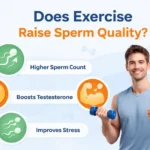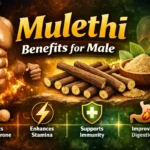
Low testosterone in men is much more common among youngsters and even adults then you realise. And the decrease in this hormone is silently killing strength, energy, mood, and sex drive. Many blame tiredness on poor sleep or low libido on work stress, but these can be early warning signs. It is very important to recognize them early and do the necessary.
In this blog, we’ll talk about 13 early signs of low testosterone you should never ignore.
Understanding Testosterone: Why It Matters
Testosterone is a male hormone naturally produced mainly in the testicles. It starts working even before a baby is born, shaping everything from reproductive organs to bone structure. At the time of Puberty, it helps build muscle, stimulate hair growth, and deepen the voice.
But testosterone isn’t just for teens or bodybuilders. Adult men need healthy testosterone levels to maintain:
- Energy and stamina
- Muscle mass and strength
- Healthy libido
- Cognitive function
- Mood stability
- Bone density
After attaining 30, testosterone levels decline naturally but when they drop too low, it can trigger several low testosterone symptoms that affect your quality of life—physically, mentally, and sexually.
13 Early Signs of Low Testosterone in Men
Here are the signs of low testosterone in men that many often overlook:
1. Diminished Sex Drive
Your libido and testosterone are tightly related. Hormonal imbalance may be the cause of a noticeable decrease in sexual interest that persists for more than a few weeks. Low testosterone can be the cause if the spark is gone and there isn’t a clear explanation.
2. Unexplained Fatigue
You feel tired all the time—even after a full night’s sleep. Maybe you’re skipping the gym, dragging yourself through work, or losing interest in hobbies. This kind of fatigue isn’t fixed by caffeine or naps. Weakness or fatigue is a common low testosterone symptom.
3. Mood Swings or Low Mood
Hormones affect your overall experience. If you find yourself feeling low, emotionally detached, or even irritable for no reason, low testosterone in men could be one of the reasons. It’s not uncommon for men with low Testosterone to experience symptoms similar to depression and anxiety.
4. Loss of Muscle Mass
You’re doing everything right at the gym but not seeing results. Or worse, you’re losing muscle despite staying active. Testosterone plays a crucial role in muscle protein synthesis in men. Without it, your strength and definition may dwindle.
5. Increase in Body Fat
Unintentional weight gain especially around the belly and gynecomastia (enlarged breast tissue in men) even without any changes in diet or activity level? low testosterone in young men or adults could be the reason. Low testosterone often contributes to increased fat storage which is hard to manage without proper attention.
6. Reduced Erections or Erectile Dysfunction
While many factors can cause Erectile Dysfunction, testosterone is one of the key factors in regulating erection quality and frequency. If you notice a reduction in spontaneous erections (like morning wood), this could be an early sign.
7. Smaller Testicle Size
Testosterone is produced in the testicles. When levels drop, the testicles themselves may shrink or feel soft. It’s one of the more physical low testosterone symptoms, may remain unnoticed unless checked actively.
8. Hair Thinning or Hair Loss
Although genetics are the primary cause of male pattern baldness, testosterone still plays a role in maintaining facial and body hair. Low testosterone in young men and adults can lead to increased shedding or thinning beyond the head.
9. Difficulty Concentrating
Brain Fogg or struggling to focus? Your Low testosterone level can affect memory, processing speed, and mental sharpness. If your mind feels slower than usual, hormones might be the one to blame.
10. Lower Semen Volume
Testosterone impacts sperm quality and semen production. A noticeable and constant drop in volume during ejaculation might be a signal that your hormones are not on the track.
11. Trouble Sleeping
Sleep disturbances, insomnia, or frequent waking up at night? What causes low testosterone levels in men often overlaps with sleep quality issues, and it becomes a cycle—poor sleep further drops testosterone.
12. Decreased Bone Density
Low testosterone in men can be a reason for lower bone mass over time, making bones more fragile and weaker. While not obvious early on, it increases the risk of fractures later in life. If you’ve had a bone scan showing lower density, low Testosterone could be part of the reason.
13. Lack of Motivation
Feeling like you’re running on empty? No drive to chase goals, make plans, or even do daily tasks? That lack of ambition or purpose may not be just emotional burnout. Hormonal imbalance could be a silent culprit.
Causes of Low Testosterone in Men
There isn’t just one cause. Low testosterone in men can stem from a variety of issues:
1. Age
The most common cause. Testosterone levels naturally decrease by about 1% per year after age 30.
2. Obesity
Fat cells convert testosterone into estrogen, reducing available T levels. In today’s world this is one of the biggest reason of low testosterone in young men as well.
3. Chronic Illness
Conditions like diabetes, kidney problems or liver disease, and HIV/AIDS are linked with low testosterone production.
4. Injury or Infection
Trauma to the testicles or infections like mumps can impact hormone production permanently.
5. Medications
Long-term use of opioids, corticosteroids, or antidepressants are known contributors to low testosterone in young men symptoms.
6. Sleep Apnea
Poor sleep and lack of oxygen during rest can inhibit testosterone release. A lot of men with untreated sleep apnea have low Testosterone.
7. Stress
Chronic stress raises cortisol—a hormone that blocks testosterone production. High-stress lifestyles are a rising cause of low testosterone in young men today.
What You Can Do If You Notice the Symptoms
You don’t have to guess. If you resonate with several of the signs listed, it’s worth talking to a doctor. Diagnosis typically involves a blood test done early in the morning, when testosterone levels are at their peak.
If diagnosed with low testosterone, your doctor might recommend:
- Lifestyle changes (weight loss, better sleep, stress reduction)
- Treating underlying medical issues
- Testosterone Replacement Therapy (TRT), if appropriate
Important: Never self-diagnose or start supplements without medical supervision. Hormones are complex, and balancing them requires expert care.
Final Thoughts
Awareness is the key! Low testosterone in men doesn’t mean a low-quality life but the first step is to be aware of your body. Pay attention to the signs, like feeling off and What’s changed? Get your hormones checked take proper sleep and nutrition, exercise regularly.
Testosterone might be silent, but its effects can be threatening. Recognizing the early signs and understanding the causes of low testosterone in men can help you take action before those whispers become roars.
So, if something doesn’t feel right, take professional help. Get your body checked. It might just change everything—from how you show up at work, in the gym, and at home, to how you feel about yourself.
People Also Searches:
Libido Boosting Foods | Low Libido in Men | Low Testosterone in Men | Ayurvedic Medicine for Sex | Exercises to Boost Testosterone | Stamina Booster Foods | Mens Performance | Sexual Health | Causes of Low Libido in Men | Signs of Low Libido in Men | Habits to Boost Libido | Ayurvedic Medicine for Sex Power







Leave a Reply